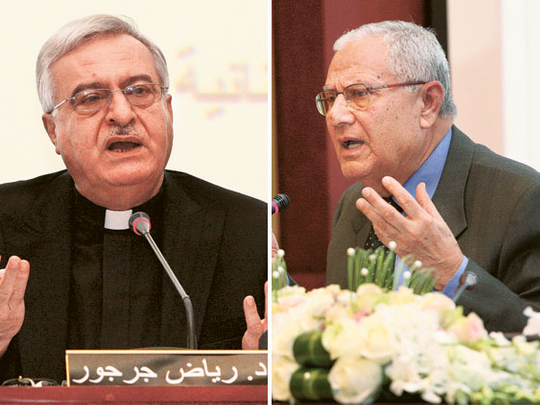
Abu Dhabi A Muslim-Christian dialogue could not have been better timed given the rise of Islamist movements in countries swept by Arab revolutions that had left Christian communities extremely wary of what lies ahead, religious leaders said.
"As revolutions in the Arab countries have not yet brought greater democracy nor better living conditions, large segments of Christian populations there were left extremely wary of what lies ahead with hundreds of thousands fleeing their countries," said the Rev Dr Riad Jarjour, secretary-general of the Arab Group for Muslim-Christian Dialogue.
Exodus highlighted
The Rev Dr Jarjour stressed the need for dialogue between Muslim and Christian communities in the Arab world and elsewhere, drawing attention to the fact that the once million-strong Christian population in Iraq had been reduced to just 350,000 people. "More than 300,000 Christians emigrated from Egypt since the revolution erupted there, sending shudders through the Copts, who make up about 10 per cent of the country's 80 million population."
The Rev Dr Jarjour was speaking at the Emirates Centre for Strategic Studies and Research (ECSSR) on Wednesday. "Inter-religious dialogue between Muslims and Christians in the Arab world offers an alternative to the attitudes of fear and suspicion and promotes co-existence as equal citizens in their countries," he said.
Dr Mohammad Al Sammak, a founding member of the Arab Group for Muslim-Christian Dialogue, echoed the need for coexistence between Muslims and Christians in a society where freedom, justice, equality, and citizens' rights received utmost respect.
The group, founded in 1995, included members from the UAE, Lebanon, Syria, Egypt, Jordan, Palestine and Sudan.
Dr Al Sammak said the emigration of hundreds of thousand of Christians from Egypt, Jordan, Iraq and Lebanon to Europe, the US, Canada and Australia raised the question whether Arab Muslims accept Arab Christians and appreciate their difference.
"The Western communities would argue [that] if Arab Muslims cannot accept Arab Christians, how can they [Western communities] accept Muslims," he said.
Willingness
Dr Al Sammak stressed the importance of dialogue based on teachings of Islam, which recognise the unity and diversity of humankind. "Allah the Almighty has honoured human beings and created them different so that they may know each other. This means that diversity stems from a divine willingness, and that its existence embodies and expresses the divine willingness and that the objective sought from diversity is to know each other, in order to achieve a unity that preserves and maintains diversity," he said.
He stressed that mutual understanding is the bridge that links the different communities but no mutual understanding can be achieved without knowledge.
Citing Freud's talks about the narcissism of difference and that, though the differences may be minor, they are still at the heart of everyone's identity, Dr Al Sammak said mutual understanding which rests on knowledge is one of the most sublime calls by God to man, and is the basis for a human brotherhood respecting differences, making it the cornerstone of alliance, concord and love and portraying a bright picture of the relationship between Islam and Christianity.







